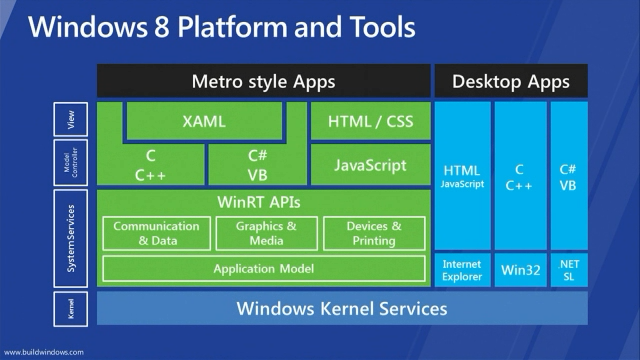I got home very late from work last night as I watched the keynote from Microsoft’s Build conference before leaving the office. Tonight, I guess I’ll be doing the same, for day 2.
At the start, I was mildly interested, Microsoft has been uninspiring for a while now – failing to gain traction with a mobile operating system, with Windows selling well despite an uncertain future, and competitors apparently cleaning up in the tablet market. Microsoft’s stock price has been pretty-much static and many (myself included) have questioned the company’s leadership, especially as it lost a succession of high-profile executives.
There was a time when I was a great Microsoft advocate, but the keynotes have always been a little dull – what we’ve seen with Windows 8 so far is inspirational though. By midway through the first keynote I was tweeting:
I’ve long since argued that Microsoft should bring its phone OS to PCs – dump the legacy, and make a bold move towards lightweight, single-purpose apps. After all, as Brett King put it:
Content is the future and operating systems, devices, all of that infrastructure is just a means to an end – it’s how we get to the data. Even so, I’d like to think I’m a pragmatist – and some of my colleagues are still ranting about the introduction of the ribbon interface in Office (almost half a decade ago) – so how will people respond to the removal of chunks of Windows NT legacy and a totally new user experience as part of the “metrofication” of Windows?
That’s why I think Microsoft has been extremely smart. Some are questioning the existence of two user interfaces on one operating system but why not? I can swap out window managers on Linux, we have seen “classic modes” of previous Windows versions and, yes, I’m sure a traditional Windows 32 app will look ugly on a Windows 8 system but that’s the price of supporting legacy – like Classic applications on OS X (now, thankfully, confined to the past).

Microsoft is supporting “traditional” applications, alongside a move towards HTML5 and XAML and – this is the smart part – running apps on multiple architectures (x86 or ARM) without recompilation. In one huge leap they have taken Windows forward and there seems to be a convergence between PC, phone and web. One Windows to rule them all. Sure, that’s what Microsoft has been telling us for ages but many of us doubted the company’s ability to pull this off.
There are some great new features in Windows 8 and whilst I’m tempted to provide a run-down, others have done a much better job – I’ll concentrate on the analysis…
For consumers, Windows 8 looks fantastic, supports some great new hardware, and could even win back some mindshare from Apple [steady on Mark…]
For the enterprise, there is only one question that matters: what’s the business case for a Windows upgrade – why would a CIO invest in Windows 8? Don’t give me features and advantages, but real business benefits (Microsoft has never been good at this, and would probably argue this is where partners add value).
- To start with, I’m impressed that Windows will boot so quickly and consume fewer resources on the same hardware – perhaps the decline in PC sales is less to do with Apple’s tremendous efforts with the iPad and more to do with longer replacement cycles. I do find myself asking whether maybe Microsoft could take a step further though, to strip out even more legacy support (maybe in Windows 9?).
- Support for consumerisation via an application store is also a positive step (I called for this last year, and certain ‘softies told me it was a daft idea…) but we also need the ability to create enterprise application stores – where I can make both Microsoft and non-Microsoft apps available within an organisation. After all, BYO is not for everyone – and there will still be organisations rolling out Windows internally, with their own set of approved applications (although hopefully with a much greater emphasis on delivering content via a browser).
- I can see the ability to baseline a system and restore to a known state resulting in major cost savings; however it’s tempting to just wipe and reload, instead of performing any form of root cause analysis – we’re unlikely to find out where problem applications are and fix them if all we do is reload the system. Let’s not forget too that a reload still leads to lost productivity for end users – albeit a significant improvement on the status quo.
- In-kernel anti-malware protection could potentially make a huge difference to security; but the issue of patching is still there (as it is in competing operating systems) – it’s all very well making the notification more subtle but the fact Windows contains so much legacy, is so big and needs so many updates is still a concern.
- And what about integrating with the cloud – not with Windows Live – but with a private cloud, or with another set of cloud services? Yes, the future (the present, even) is cloudy but maybe I don’t want internal documents being shared on SkyDrive? And, heaven forbid, perhaps the answer isn’t SharePoint either (SharePoint seems to be Microsoft’s answer for rolling out enterprise equivalents to its public cloud services internally).
I imagine some of my questions will be answered as more and more details of Windows 8, Office 15 and new generations of cloud services are revealed but, based on what I heard yesterday, Microsoft has indeed, re-imagined Windows… I haven’t been this impressed with a Microsoft keynote for a long time (maybe ever?) butJon Honeyball (himself, an extensive Apple user) beautifully summed the situation up in just a few words:
Just in the nick of time…
[Updated 14 September 2011: provide additional links/graphics and improve grammar]



One thought on “Has Microsoft found its mojo?”